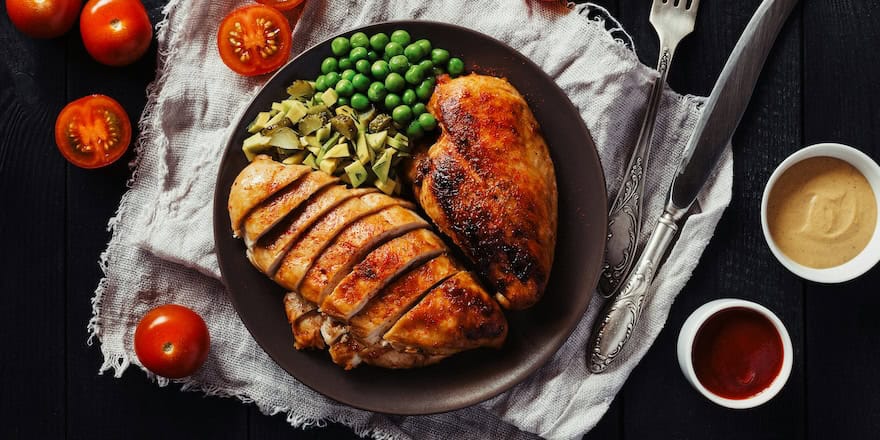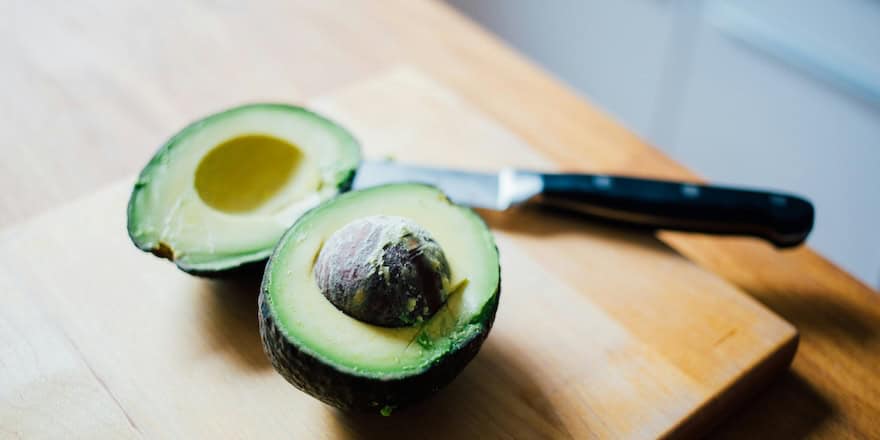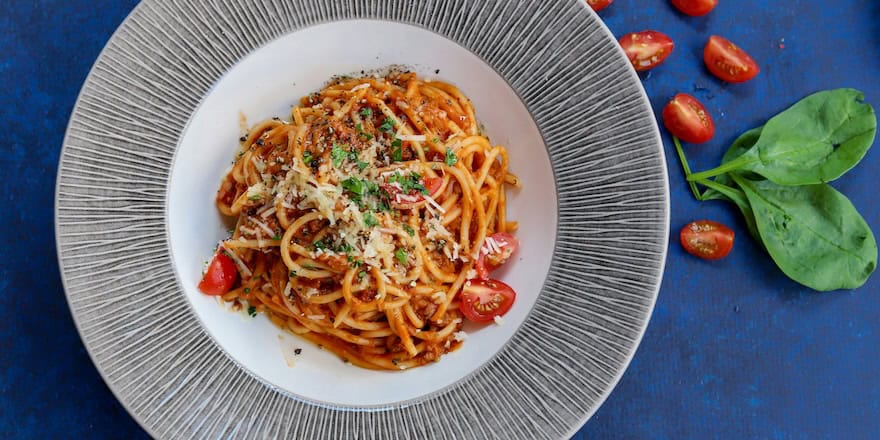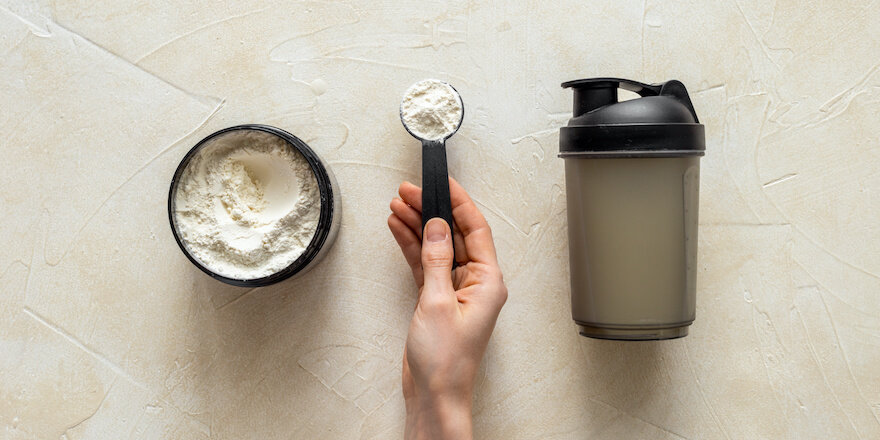Because nutrition is the main fuel for muscles, pairing your workouts with appropriate meals is a priority in your bulking strategy.
Often, bulking is reduced to a calorie surplus or more protein. In reality, it is much more than that.
The bulking meal must be sufficient in quantity and satisfying in quality to support energy and overall health.
I share with you the nutritional advice I give to my athlete patients, for successful bulking meals.
📚 Also read | Bulking: the 4 best whey isolates, according to a dietitian
1. Assess your energy needs for bulking

If your weight is relatively stable, increasing energy intake is indeed helpful for promoting mass gain.
Between 250 and 500 extra calories per day for gradual mass gain are sufficient. It is neither necessary nor recommended to go beyond this to avoid excessive fat gain, as summarized by this study.
If you tend to experience yo-yo weight changes, you can use dietary calculations to calculate your needs more precisely:
Basal metabolic rate (BMR) calculation
For men: BMR = 1.083 × weight kg⁰·⁴⁸ × height cm⁰·⁵⁰ × age⁻⁰·¹³
For women: BMR = 0.963 × weight kg⁰·⁴⁸ × height cm⁰·⁵⁰ × age⁻⁰·¹³
Calculation of daily energy expenditure (DEE)
Once the BMR is calculated, multiply it by an activity coefficient (NAP), according to your activity:
- Sedentary = 1.2
- Moderate activity = 1.55 (moderate exercise 3 to 5 times per week)
- Intense to very intense activity = 1.7 – 1.9
Then add 250 calories. You now have a reference for the caloric needs required for your bulking and can now focus on food quality.
2. Protein to nourish the muscles

Pillars of muscle building, proteins provide essential amino acids that the body cannot produce on its own.
To promote the repair and growth of muscle tissue, aim for 1.6 to 2 g of protein / kg of body weight.
Emphasize dietary proteins; they are all worthwhile and help meet your intake:
- lean meats (chicken, turkey, ham without rind, beef 5% fat…), fish, shellfish and fatty fish (1 to 2 times per week)
- eggs (preferably organic)
- plant proteins: legumes, semi- or whole-grain cereals, oilseeds and seeds
- dairy products (low-fat)
Each main meal during bulking should therefore include them. Simply adjust their quantity according to your needs.
3. Healthy fats for your balance

Although often feared, fats also matter and contribute to a balanced bulk. They are needed at every meal.
They play a crucial role, notably in the production of testosterone, an important hormone for muscle development. They are also crucial for energy and the enjoyment of food thanks to the flavors they provide.
Prioritize healthy fats to ensure a satisfactory intake of essential fatty acids. Omega-3s, beneficial for muscle mass according to this study, but also omega-6s, to care for the cardiovascular system and limit storage:
- favor unsaturated and plant-based fats: avocados, nuts, seeds, olive and canola oils, fatty fish, almond or peanut butter, coconut milk…
- limit saturated and trans fats: animal fats, industrial, processed and fried products
In general, in a mass-gaining context, fats should account for roughly 25 to 35% of your total daily calorie intake.
To give you a guideline: that’s about 15 to 20 g of fats per meal.
📚 Also read | A pharmacist selected the best omega-3s
4. Carbohydrates for muscle development

To maintain good energy levels and support performance during training, carbohydrates are essential for mass gain.
Indeed, carbohydrates are converted and stored as glycogen, the fuel for your muscles. To optimize your meals, here are some tips:
- consume complex carbohydrates at main meals: brown rice, pasta, sweet potatoes, red lentils, quinoa, whole sourdough or multigrain bread
- Vegetables: all kinds, preferably seasonal and/or organic; they provide vitamins, antioxidants and fiber to support lasting and stable energy
- Include some fruits around your workouts, before and after your sessions, for example, to maintain your glycogen levels
- adjust the amount to your needs: aim for 5 g of carbohydrates per kg of body weight on average
Practical example: if you weigh 90 kilograms, 5×90 = 450 g of carbohydrates per day represents your average needs, i.e., 50 to 65% of total energy.
5. Example meal for gaining mass

Here is an example of a balanced meal for mass gain, including all the essential macronutrients to promote muscle growth and provide you with energy:
Appetizer
Grated carrots dressed with olive oil and lemon
Main course
- Roast chicken
- Sweet potatoes with sesame sauce
- Pan-fried Mediterranean vegetables
Dessert
- Diced mango
- 4-5 almonds
Nutritional content of the bulking meal
- Protein: 69 g
- Carbohydrates: 58 g
- Fats: 20 g
- Total meal calories: 790 kcal
I suggest that you vary your recipes by planning your weekly menus so you don’t get bored and avoid ‘meals on the go’ that are less suited to your goals.
You can also include 1 to 2 snacks per day to top up your daily calories. Spreading your energy intake helps prevent energy slumps during workouts and ensures a well-balanced intake of nutrients.
If needed, protein shakers are convenient and can easily fit into your routine between meals.
📚 Also read | 12 whey protein brands tested and analyzed
Finally, to assess whether your muscle-gaining meals are right for you, aim for gradual weight gain: 0.5 to 1 kilogram per week.
If you gain weight too quickly or nothing changes on the scale, you should consider rebalancing your diet and training.
Sources and scientific studies
Maughan, R. J., & Burke, L. M. – Practical Nutrition for Team Sports – Journal of Sports Sciences, 2012
Phillips, S. M., & Van Loon, L. J. C – Dietary Protein for Athletes: From Requirements to Metabolic Advantage – Applied Physiology, Nutrition, and Metabolism, 2011
Stephen M Cornish , Dean M Cordingley , Keely A Shaw , Scott C Forbes – Effects of Omega-3 Supplementation Alone and Combined with Resistance Exercise on Skeletal Muscle in Older Adults: A Systematic Review and Meta-Analysis, Nutrients, 2022



